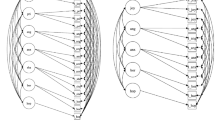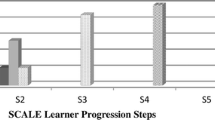Abstract
This study examines the emotional responses of three individuals to timed mathematics tests. We examine the emotional responses of two adult women who look back to timed skills-tests in elementary school and the emotional response of a grade-three girl currently taking timed skills-tests. To interpret the individual reactions, we use a non-Newtonian view of time and draw on Mandler's insights into the nature of emotional responses. We examine the implications of these emotional responses for equitable assessment practices.
Similar content being viewed by others
REFERENCES
Bassarear, T.: 1989, The Dynamic Interaction of Cognitive and Non-Cognitive Factors in Learning Mathematics, Paper presented at the annual conference of the New England Educational Research Organization, Portsmouth, NH.
Brown, S.I. and Walter, M.: 1983, The Art of Problem Posing, Franklin Press, Philadelphia.
Buxton, L.: 1981, Do You Panic About Maths? Heinemann, London.
Buxton, L.: 1991, Math Panic, Heinemann, Portsmouth, NH.
Carpenter, T.P., Fennema, E., Franke, M.L., Levi, L. and Empson, S.: 1999, Children's mathematics: Cognitively guided instruction, Heinemann, Portsmouth, NH.
Carter, K. and Doyle, W.: 1996, 'Personal narrative and life history in learning to teach', in J. Sikula, T.J. Buttery and E. Guyton (eds.), Handbook on Teacher Education, Simon & Schuster Macmillan, New York, pp. 120–142.
Cobb, P., Yackel, E. and Wood, T.: 1989, 'Young children's emotional acts while engaged in mathematical problem solving', in D.B. McLeod and V.M. Adams (eds.), Affect and Mathematical Problem Solving: A New Perspective, Springer-Verlag, New York, pp. 117–148.
Friend, K.E.: 1982, 'Stress and performance: Effects of subjective work load and time urgency,' Personnel Psychology 35(3), 623–633.
Gallagher, S.: 1998, The Inordinance of Time, Northwestern University Press, Evanston, IL.
Garcia, C.L.: 1998, Too Scared to Learn: Overcoming Academic Anxiety, Corwin Press, Inc., Thousand Oaks, CA.
Gierl, M.J. and Bisanz, J.B.: 1995, 'Anxieties and attitudes related to mathematics in grades 3 and 6,' Journal of Experimental Education 63(2), 139–158.
Goldin, G.A.: 2000, 'Affective pathways and representation in mathematical problem solving,' Mathematical Thinking and Learning 2(3), 209–219.
Harper, N.W. and Daane, C.J.: 1998, 'Causes and reduction of math anxiety in preservice elementary teachers,' Action in Teacher Education 19(4), 29–38.
Hiebert, J., Carpenter, T.P., Fennema, E., Fuson, K., Wearne, D., Murray, H., Olivier, A. and Human, P.: 1997, Making Sense: Teaching and Learning Mathematics with Understanding, Heinemann, Portsmouth, NH.
Hembree, R.: 1987, 'Effects of noncontent variables on mathematics test performance,' Journal for Research in Mathematics Education 18(3), 197–214.
Hembree, R.: 1990, 'The nature, effects and relief of mathematics anxiety,' Journal for Research in Mathematics Education 21(1), 33–46.
Hunsley, J.: 1987, 'Cognitive processes in mathematics anxiety and test anxiety: The role of appraisals, internal dialogue and attributions,' Journal of Educational Psychology 79, 388–392.
Immerman, M.A.: 1980, The Effect of Eliminating Time Restraints on a Standardized Test with American Indian Students, (ERIC Document Reproduction Service No. ED 196 584)
Jackson, C.D. and Leffingwell, R.J.: 1999, 'The role of instructors in creating math anxiety in students from kindergarten through college,' The Mathematics Teacher 92(7), 583–856.
Kazelskis, R., Reeves, C., Kersh, M.E., Bailey, G., Cole, K., Larmon, M., Hall, L. and Holliday, D.C.: 2000, 'Mathematics anxiety and test anxiety: Separate constructs? Journal of Experimental Education 68(2), 137–46.
Knutson, K.A. and McCarthy-Tucker, S.N.: 1993, Gifted Education for Native American Students: A State of Affairs, (ERIC Document Reproduction Service No. ED 362 372)
Kohn, A.: 2000, The Case Against Standardized Tests: Raising the Scores, Ruining the Schools, Heinemann, Portsmouth, NH.
Ma, X.: 1999, 'A meta-analysis of the relationship between anxiety toward mathematics and achievement in mathematics,' Journal for Research in Mathematics Education 30(5), 520–40.
Mandler, G.: 1989, 'Affect and learning: Causes and consequences of emotional interactions,' in D.B. McLeod and V.M. Adams (eds.), Affect and Mathematical Problem Solving: A New Perspective, Springer-Verlag, New York, pp. 3–19.
Mason, J., Burton, L. and Stacey, K.: 1982, Thinking Mathematically, Addison-Wesley, London.
McLeod, D.: 1992, 'Research on affect in mathematics education: A reconceptualization,' in D. Grouws (ed.), Handbook on Research on Mathematics Teaching and Learning Macmillan, New York, pp. 575–596.
McLeod, D.B. and Adams, V.A. (eds.).: 1989, Affect and Mathematical Problem Solving: A New Perspective, Springer-Verlag, New York.
National Council of Teachers of Mathematics: 1995, Assessment Standards for School Mathematics, Author, Reston, VA.
National Council of Teachers of Mathematics: 2000, Principles and Standards for School Mathematics, Author, Reston, VA.
Newstead, K.: 1998, 'Aspects of children's mathematics anxiety,' Educational Studies in Mathematics 36(1), 53–71.
Onwuegbuzie, A.J. and Seaman, M.A.: 1995, 'The effect of time constraints and statistics test anxiety on test performance in a statistics course,' Journal of Experimental Education 63(2), 115–124.
Pekrun, R.: 1988, 'Anxiety and motivation in achievement settings: Towards a systemtheoretical approach,' International Journal of Educational Research 12, 307–323.
Plass, J.A. and Hill, K.T.: 1986, 'Children's achievement strategies and test performance: The role of time pressure, evaluation anxiety, and sex,' Developmental Psychology 22(1), 31–36.
Reys, L.H.: 1984, 'Affective variables and mathematics education,' The Elementary School Journal 84, 558–581.
Slife, B.D.: 1993, Time and Psychological Explanation, SUNY Press Albany, NY.
Steele, D.F. and Arth, A.A.: 1998, 'Math instruction and assessment: Preventing anxiety, promoting confidence,' Schools in the Middle 7(3), 44–48.
Tobias, S.: 1985, 'Test anxiety: Interference, defective skills and cognitive capacity,' Educational Psychologist 20, 135–142.
Wagner, S., Rachlin, S.L. and Jensen, R.J.: 1984, Algebra Learning Project: Final Report, University of Georgia Athens, GA.
Williams, S.R.: 1993, 'Mathematics and being in the world: Toward an interpretive framework,' For the Learning of Mathematics 13(2), 2–7.
Author information
Authors and Affiliations
Rights and permissions
About this article
Cite this article
Walen, S.B., Williams, S.R. A Matter of Time: Emotional Responses to Timed Mathematics Tests. Educational Studies in Mathematics 49, 361–378 (2002). https://doi.org/10.1023/A:1020258815748
Published:
Issue Date:
DOI: https://doi.org/10.1023/A:1020258815748




